
Please
write: dan@dancooper.tv
Return to Page One
Register here to receive
Fashion Finds
email updates!


She stars in her own show, which is named for her. Angela isn't a high achiever. She's pretty much at the bottom of Mrs. Brinks' class. Angela's got friends, she's got, well, let's call them yucky people to contend with, she's got her family and her dog, and her life is full of the stuff that happens when you're in third grade. Angela does her homework, plays, has fantasies, and is generally a wonderful kid.
Angela Anaconda is a great show (it's seen in the US on the Fox Family Channel) on its way to becoming a major hit.
Angela was created by two brilliant women, Joanna Ferrone and Susan Rose.
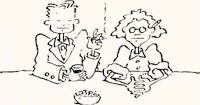 Joanna left, Susan right. |
We interviewed Joanna at the end of a busy production day. With story meetings swirling around her, animation being done in Toronto, network meetings in LA just days before, Joanna was a sea of calm. Having created the underground cult character Fido Dido (soon to have his own TV show),
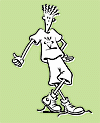 Fido Dido |
and having a rich background in the visual arts, Joanna has a remarkable ability to cut through the nonsense and talk about her mission -- creating, in Angela Anaconda, a show for young people that tells them that being yourself isn't only good enough, it's the greatest thing you can do.
Gina Pia Cooper: And your hairís never out of place, right?
Joanna Ferrone: I would look at shows like that, and think, "Whatís wrong with me? Whatís wrong with my perfectly nice family that isnít perfect? Why arenít they perfect? Isnít this the way itís supposed to be?"
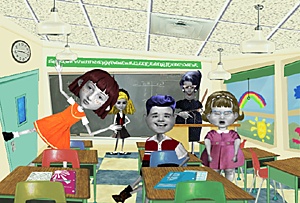 Left to right, Angela Anaconda, Nanette Manoir, Johnny Abatti, Mrs. Brinks, and Gina Lash. |
I think that a show like Angela can give kids a sense that itís all right for things to not be perfect, and in addition, toward that end, weíve got characters who are very purposely put there to reflect what children would normally perceive and treat as negative stereotypes. And weíre basically going against stereotype.
 Gina Lash |
Not only is, for instance, Angelaís best friend, Gina Lash, the chubbiest, and some would say by the ridiculous American standards that are imposed on little girls, the least attractive kid. That kid is Angelaís best friend, and she is completely unabashed about her absolute devotion to food. Especially cinnamon swirls, and anything sweet and delicious. And she has no qualms about it. Sheís also the smartest girl in the class, so donít mess with her. And she has a great deal of self confidence and presence, and sheís not apologizing to anyone for anything.
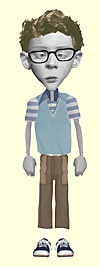 Gordy Rhinehart |
Similarly, you have Gordy Rhinehart, who one would argue is the most wimpy boy in the class, who is always walking around with his inhaler, because of asthma and whatever. And his strength is that heís really not afraid of anything except mold spores. Heís actually a very courageous little guy. He doesnít have the physical wherewithal.
His father is the coach. His father is a burly type, you know, coach kind of guy, who thinks Gordy is just absolutely great the way he is. He doesnít have to be a linebacker for his dadís approval. His dad loves him. He doesnít need to be the toughest kid in the class for Johnny Abatti and Angela and Gina to accept him as a friend. Gordy likes to make paper mache creations, and needlepoint, and do hairdos, and do all kinds of things that typically if a little boy did, heíd be ostracized.
Gordy Rhinehart, in fact, is passionately in love with Gina Lash. He just happens to be a romantic. He happens to be a passionate guy. He may grow up to fall in love with Johnny Abatti instead, which you shouldnít probably print. But you know, who cares? Itís like, let everybody be who they are. Weíre not trying to be subversive, or have a hidden agenda of teaching kids to share, or you know FCC kinds of what have you.
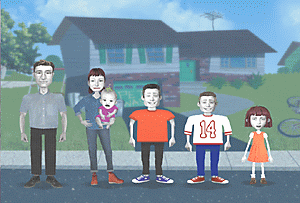 Angela's family. |
But teaching kids to let each other be, and accept each other, and find interest in each otherís differences, rather than be a cause for ridicule. If we can do any of that, thatís really something. Besides making people laugh.
And given that Angela is for me very autobiographical, that was the most natural thing.
 Joanna Ferrone |
It just happened. It was autobiographical not in the sense of specifically having a Nanette Manoir to contend with.
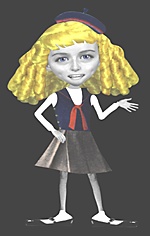 Nanette Manoir |
I was, however, the kind of kid who looked at other kids and thought gee, you know, rather than the peanut butter and jelly sandwich in wax paper floating around in the bottom of this giant brown Pathmark bag, that was the kind of kid who grows up in a family of eight kids that isnít particularly organized.
As wonderful as my mother was, and I knew a girl named Donna Capizoli, whose father was the football coach, and her mom every day gives Donna a flying saucer sandwich, that has ham and melted cheese inside, and Iím looking at her sandwich and thinking why canít that be me?
And that didnít cause me to dislike Donna Capizoli, or feel that I had to take revenge on her. And so I did tend to make those sort of comparisons. I think all kids do.
Gina Pia Cooper: Yes, itís that revelatory moment where you realize youíre not all the same.
Joanna Ferrone: Right. And you know, the other thing that a kid generally does, and that I did a lot of, is to sort of take control of their world and their minds. In my mind, I had myself a little car that was just the right size for me. Why should just grownups get to drive? Maybe that was something that occurred to me as a consequence of literally having to walk three miles to the bus stop every day.
And also in my mind, I was able to perform all kinds of heroic acts, and save the people that I cared about from frequent drownings and the like.
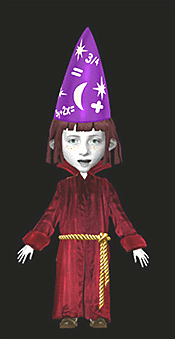 |
I think also there was this voice in my head that that spoke the way that Angela speaks. Angela repeats phrases: you know, "Today is the day of our school -- of our, you know, field trip for the class. You know, our annual field trip -- our annual class field trip for the class."
The way that children talk in kind of repeat words, and repeat phrases, and sound like small grownups. And I think they think of themselves as small grownups; and especially if theyíre telling you something that they consider to be important. Theyíre going to express themselves with more words than necessary, or more repetition than you would think necessary. Theyíre not going to speak grammatically correctly. And so there was a certain element of that in creating Angela Anaconda.
 Angela's dog King. |
And then when it came to Angela's fantasies, theyíre not dreams in the sense of Angelaís daydreaming; theyíre dreams in the sense of being very associative. So a lot of the elements of things that happen in an episode can be brought into these fantasies at random.
And as far as the way Angela speaks in these fantasies -- she speaks for herself, of course, and she speaks for Nanette Manoir, or whoever else happens to be in the fantasy, putting words in peopleís mouths. So she really is controlling her world. This little kid who canít control a damn thing, and she knows she suddenly is controlling every aspect of her world. And itís a wonderful outlet. I mean, that is her reality.
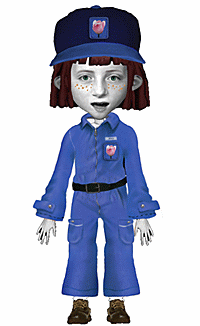 |
People might want to say that everybody
is created equal, and we are. But we do not start from the same place, and
finish at the same place. Itís not equal; itís not equitable. And one
way to compensate for that glaring apparent inequity is to have an
imagination. I think itís a reasonable outlet for a child.
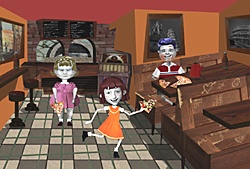 After school at Abatti's Pizza. |
 |
|
|